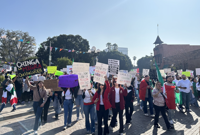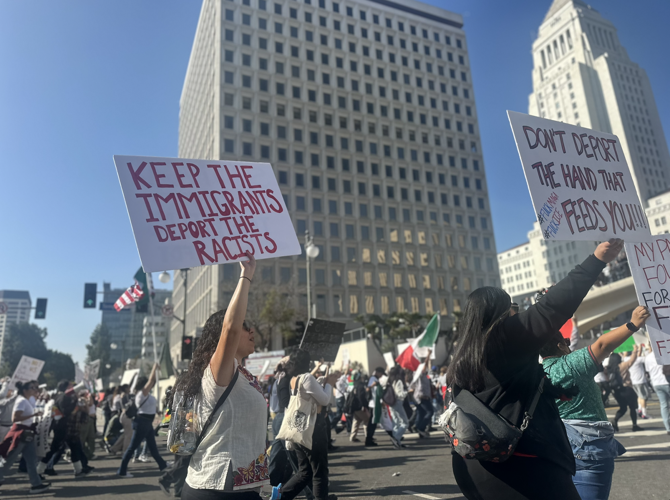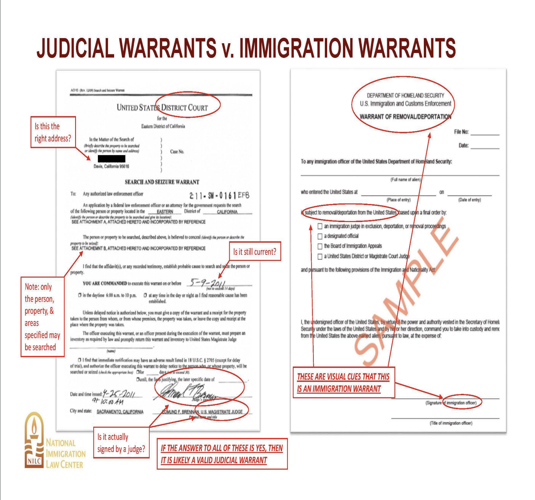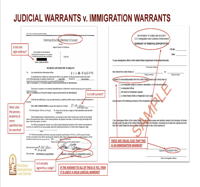
Protestors take over the street in Los Angeles to protest anti-immigration raids on Sunday Feb 2, 2025. (Image credit: Brenda Verano)
As the Trump administration ramps up its crackdown on immigrant communities, with ICE raids becoming increasingly aggressive, the need for heightened awareness of rights has never been more urgent, particularly for individuals living in sanctuary cities. While these cities offer certain protections against deportation, they do not make residents immune from federal immigration enforcement.
A sanctuary city is a term used to describe a city, county or jurisdiction that has policies in place designed to limit local law enforcement's cooperation with federal immigration authorities, particularly U.S. Immigration and Customs Enforcement (ICE), the U.S. Department of Homeland Security (DHS), and U.S. Customs and Border Protection (CBP). These policies are intended to protect undocumented immigrants from deportation or other immigration enforcement actions within the jurisdiction, often based on concerns about community safety, human rights and local resources.
Legal experts and community organizers are highlighting the importance of understanding both the rights and limitations of living in a sanctuary city. Cara Jobson, an immigration attorney with over 25 years of experience and partner at Wiley & Jobson, spoke with CALÓ News about navigating the complex legal landscape under the current administration.
Jobson emphasized the importance of staying well-informed to protect oneself during encounters with immigration enforcement, noting that individuals must be aware of their rights. “The California Values Act outlines these rights in detail,” she said, referencing the specific guidelines that apply to local and state law enforcement.

A demonstrator holds a sign that says "keep the immigrants, deport the racists" during an anti-ICE rally in Los Angeles on Feb 2, 2025. (Image credit: Amairani Hernandez)
The California Values Act, also known as Senate Bill 54 (SB 54), is a state law designed to limit the involvement of local and state authorities in federal immigration enforcement. Signed into law in October 2017, the legislation prohibits state and local law enforcement from using resources to investigate, detain or arrest individuals based solely on immigration status. It also restricts cooperation with federal immigration authorities.
“For instance, police officers and sheriffs are not permitted to ask about someone's immigration status, nor are they allowed to arrest someone solely for an immigration violation,” Jobson explained.
Local police officers generally cannot be compelled to act as "force multipliers" for ICE under sanctuary policies. This means they are not required to ask about immigration status, share information about an individual's immigration status or participate in joint operations with ICE unless it is related to a criminal investigation.
Jobson further emphasized that SB 54 also ensures protections for individuals detained for other crimes. “If someone is arrested for a minor offense, they cannot be held in jail longer than necessary simply to give ICE time to take custody of them,” Jobson said, highlighting the safeguards provided by the law.
Sanctuary city policies limit Immigration Customs Enforcement
As residents continue to face the threat of detention or deportation amid the current administration’s intensified immigration policies, many are turning to clear explanations of sanctuary city protections. While these policies can vary by jurisdiction, they generally include a combination of the following key elements:
Limiting cooperation with ICE: Sanctuary cities often prohibit or restrict local law enforcement officers from asking about an individual’s immigration status during routine interactions (e.g., during traffic stops, arrests, or other engagements). Additionally, they may refuse to honor ICE "detainers"—requests by ICE to hold an individual in jail after their release date for the purpose of deportation.
Non-cooperation with ICE raids: Local law enforcement in sanctuary cities may not actively participate in federal immigration enforcement, such as ICE raids or workplace immigration enforcement operations.
Access to local services: Sanctuary policies can also include provisions that ensure undocumented immigrants have access to local services such as healthcare, education and legal aid, without fear of being reported to immigration authorities.
While these policies restrict local law enforcement from engaging with immigration authorities, they don’t prevent federal agencies like ICE, Border Patrol and DHS from operating within those jurisdictions. Federal agents can still make arrests and conduct investigations based on their enforcement priorities, including raids targeting individuals for deportation.
ICE can also use administrative (immigration) warrants to arrest individuals in violation of immigration laws, even in sanctuary cities. However, administrative warrants don’t allow agents to enter private homes. Only judicial warrants, signed by a judge, grant law enforcement the authority to do so. Immigration advocates such as the National Immigration Law Center, have urged individuals to know the difference between the two and do not volunteer additional information.

A changing legal and political landscape
Still, there are limitations to protections awarded by sanctuary cities, especially those closer to the border. For example, federal law grants CBP the authority to board vehicles and vessels in search of individuals without immigration documentation “within a reasonable distance from any external boundary of the United States.” This includes not only international land borders but also the entire U.S. coastline. According to the ACLU, CBP claims the power to board buses and trains without a warrant anywhere within this 100-mile zone.
In situations that lead to detainment or arrest, Jobson advises individuals to exercise their constitutional right to remain silent and not speak to authorities without legal representation. “What often happens, whether it’s immigration enforcement or regular law enforcement, is that people cooperate to their own detriment,” she explains. “They talk, and in doing so, they end up [unintentionally] waiving some of their rights.”
In short, while sanctuary city policies limit local law enforcement cooperation with federal immigration authorities, they do not eliminate the ability of ICE, Border Patrol and DHS to carry out immigration enforcement within those areas. However, the level of cooperation between local authorities and federal immigration agencies is significantly reduced.
Despite the shifting political landscape, Jobson emphasizes that there are laws in place to protect individuals, regardless of their immigration status. “It’s not always easy to stand up for your rights,” she says. “The first step is knowing what they are, and the second step is being prepared to stand for them.”







(0) comments
Welcome to the discussion.
Log In
Keep it Clean. Please avoid obscene, vulgar, lewd, racist or sexually-oriented language.
PLEASE TURN OFF YOUR CAPS LOCK.
Don't Threaten. Threats of harming another person will not be tolerated.
Be Truthful. Don't knowingly lie about anyone or anything.
Be Nice. No racism, sexism or any sort of -ism that is degrading to another person.
Be Proactive. Use the 'Report' link on each comment to let us know of abusive posts.
Share with Us. We'd love to hear eyewitness accounts, the history behind an article.